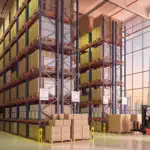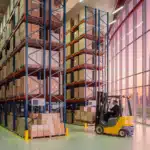In Dubai,the Fast-Moving Consumer Goods (FMCG) industry is thriving, driven by a growing population, rising consumer demand, and the city’s status as a global trade hub. At the heart of this dynamic sector involves warehousing, a critical component that ensures the seamless movement of goods from manufacturers to consumers.
Efficient warehousing supports inventory management, reduces delivery times, and enhances customer satisfaction, making it indispensable for FMCG businesses. Let us explore the importance of warehousing in Dubai, especially for the FMCG industry in 2025, highlighting its impact, innovations, and strategic importance.
Warehousing Is Crucial For FMCG Industry in Dubai
Warehousing is a cornerstone of Dubai’s booming FMCG industry, playing a vital role in helping businesses meet rising consumer expectations, capitalize on the surge in e-commerce, and compete globally. Dubai’s warehousing infrastructure is designed to support efficiency, scalability, and sustainability—making it a strategic asset for FMCG companies.
Key Highlights:
- Dubai leverages its prime geographic location to serve both regional and global FMCG markets seamlessly.
- Automation and digital tools streamline warehouse operations, ensuring faster turnaround times and improved accuracy.
- Green warehousing initiatives align with the UAE’s long-term environmental and sustainability goals.
- Flexible warehousing models cater to businesses of all sizes, from startups to large-scale FMCG enterprises.
As the FMCG industry continues to evolve in 2025, partnering with a trusted logistics provider becomes essential to staying competitive. KGRN Shipping Service LLC offers tailored logistics and warehousing solutions that empower your business to operate with precision and confidence.
The Importance of Warehousing in Dubai For FMCG Industry
Meeting High Consumer Demand
The FMCG industry thrives on speed and availability, as consumers expect products like food, beverages, personal care items, and household goods to be readily accessible. In Dubai, a cosmopolitan city with a diverse and growing population, warehousing ensures that FMCG companies can maintain sufficient stock to meet this demand. Strategically located warehouses near ports, airports, and urban centers enable rapid restocking and distribution.
For example, warehouses in Jebel Ali Free Zone (JAFZA) and Dubai South provide proximity to Jebel Ali Port and Al Maktoum International Airport, facilitating quick turnaround times. This is critical for perishable goods like dairy or fresh produce, where delays can lead to spoilage. By maintaining well-organized inventories, warehouses help FMCG businesses avoid stockouts and keep shelves stocked, even during peak seasons like Ramadan or festive periods.
Supporting E-Commerce Growth
The rise of e-commerce has transformed the FMCG landscape in Dubai, with consumers increasingly shopping online for groceries and daily essentials. Warehousing plays a vital role in supporting this shift by enabling efficient order fulfillment and last-mile delivery. Micro-fulfillment centers, small-scale warehouses located closer to urban areas, have gained popularity in Dubai, allowing FMCG companies to process online orders quickly.
In 2025, warehouses equipped with automated picking systems and real-time inventory tracking ensure that e-commerce orders are fulfilled with precision. For instance, a customer ordering snacks through an online platform expects delivery within hours, and advanced warehousing makes this possible. Dubai’s investment in smart logistics further enhances the ability of FMCG businesses to compete in the fast-paced e-commerce market.
Innovations in FMCG Warehousing
Automation and Technology
Technology is revolutionizing warehousing in Dubai’s FMCG industry. Automated storage and retrieval systems (ASRS), robotics, and warehouse management systems (WMS) streamline operations, reducing human error and increasing efficiency. These tools are particularly valuable for handling high volumes of small, diverse FMCG products, such as cosmetics or packaged foods.
In 2025, Dubai’s warehouses use Internet of Things (IoT) devices to monitor temperature and humidity, ensuring optimal storage conditions for sensitive goods like pharmaceuticals or frozen foods. Blockchain technology is also gaining traction, providing transparent tracking of goods from warehouse to consumer. These innovations not only improve operational efficiency but also enhance trust and accountability in the supply chain.
Sustainable Warehousing Practices
Sustainability is a priority in Dubai’s logistics sector, aligning with the UAE’s Vision 2030 for a greener economy. FMCG warehouses are adopting eco-friendly practices, such as solar-powered facilities, energy-efficient lighting, and electric forklifts. These measures reduce the carbon footprint of warehousing operations, which is crucial for FMCG companies aiming to meet consumer expectations for sustainable practices.
Additionally, smart inventory management minimizes waste by preventing overstocking or spoilage, particularly for perishable goods. For example, just-in-time (JIT) inventory systems ensure that products like fresh fruits are stored for minimal periods, maintaining quality and reducing waste. Dubai’s focus on green warehousing positions it as a leader in sustainable FMCG logistics.
Strategic Advantages of Dubai’s Warehousing Ecosystem
Free Zones and Tax Benefits
Dubai’s free zones, such as JAFZA, Dubai Commerce City, and Dubai Industrial City, offer significant advantages for FMCG warehousing. These zones provide tax exemptions, 100% foreign ownership, and streamlined customs processes, making them attractive for businesses looking to store and distribute goods. For FMCG companies, free zones reduce operational costs and simplify re-export to markets in the Middle East, Africa, and Asia.
Warehouses in free zones are also equipped with state-of-the-art facilities, including cold storage for temperature-sensitive products like beverages or chocolates. This flexibility allows FMCG businesses to cater to diverse markets without incurring heavy duties, making Dubai a cost-effective hub for regional distribution.
Multimodal Connectivity
Dubai’s warehousing infrastructure is seamlessly integrated with its multimodal transport network, including sea, air, and land routes. Warehouses near Jebel Ali Port can quickly receive shipments from global suppliers, while those near Dubai International Airport support rapid air freight for high-value FMCG goods like health supplements. For regional distribution, road networks connect warehouses to GCC countries like Saudi Arabia and Oman.
This connectivity reduces transit times and ensures that FMCG products reach retailers or consumers promptly. In 2025, real-time tracking systems further enhance visibility, allowing businesses to monitor shipments from warehouse to destination, ensuring reliability and customer satisfaction.
Challenges and Solutions
Managing High Costs
Warehousing in Dubai can be expensive due to the city’s premium infrastructure and high demand for space. For FMCG businesses, particularly small and medium enterprises (SMEs), this can pose a challenge. However, solutions like shared warehousing and co-warehousing allow multiple companies to split costs, making high-quality facilities accessible to smaller players.
Additionally, freight forwarders and logistics providers in Dubai offer tailored warehousing packages that optimize space and reduce expenses. By partnering with experts, FMCG businesses can access cost-effective solutions without compromising on efficiency.
Navigating Regulatory Compliance
The FMCG industry is subject to strict regulations, particularly for food safety and product labeling. Warehouses must comply with UAE standards, such as those set by the Dubai Municipality, as well as international guidelines for exports. For newcomers, navigating these requirements can be complex.
Experienced logistics partners, like KGRN Shipping Service LLC, simplify compliance by providing guidance on storage standards, documentation, and inspections. Their expertise ensures that FMCG warehouses meet all regulatory requirements, avoiding delays or penalties.
Conclusion
Warehousing is a cornerstone of Dubai’s booming FMCG industry, enabling businesses to meet consumer expectations, capitalize on e-commerce growth, and compete on a global scale. Leveraging cutting-edge technology, sustainable practices, and strategic advantages such as free zones, Dubai’s warehousing infrastructure empowers FMCG companies to operate with greater efficiency and cost-effectiveness.
As the industry continues to evolve in 2025, partnering with a reliable logistics provider is essential to harness the full potential of modern warehousing. KGRN Shipping Service LLC is your trusted partner for tailored logistics and warehousing solutions.
Looking for Reliable Shipping Services in Dubai?
If you need expert solutions for shipping, freight forwarding, or warehouse services, KGRN Shipping Service LLC has you covered. Based in Dubai, we provide professional, reliable, and tailored logistics support to meet your needs.
Contact Us Now




Leave A Comment